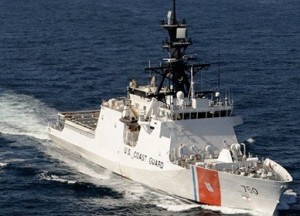 The Costa Rican legislature on December 20 approved another deployment of dozens of U.S. ships to its territory for the next six months, but denied permission for warships to deploy to the country until a full debate occurs after the New Year.
The Costa Rican legislature on December 20 approved another deployment of dozens of U.S. ships to its territory for the next six months, but denied permission for warships to deploy to the country until a full debate occurs after the New Year.
The decision came at a moment when the country’s relationship with neighboring Nicaragua remains tense. Congress granted permission for the deployment of 46 U.S. Coast Guard ships, 42 armed helicopters, and up to 4,000 sailors to combat drug trafficking.
Only four legislators voted against the deployment. Juan Carlos Mendoza, leader of the Citizen Action Party, explained that his opposition to the agreement is based on the United States being at war and that, as such, even Coast Guard ships are under the mandate of the military. “Costa Rica signed a patrolling agreement with civilian authorities and not with the military part. This could be violating the active and permanent neutrality of our country,” he said.
Another deputy, José María Villalta of the Broad Front, said there is no evidence that the deployments have contributed to reducing drug addiction or to traffickers changing their routes away from Costa Rica.
Meanwhile, the day after its approval of the U.S. naval deployment, Costa Rica denounced Nicaragua at the United Nations for the presence of troops along the San Juan River that serves as a border between the two nations. Its government alleged that Nicaragua had “invaded” and “occupied” Costa Rica. The same day, Nicaragua protested an “incursion” into Nicaragua by Costa Rican ships and a plane. Costa Rican ambassador to the UN, Eduardo Ulibarri, said that his country has no military, and has instead appealed to the OAS, but that Nicaragua had rejected the OAS’s jurisdiction. Nicaragua asserts that its troops dredging the river are in their own territory, which extends to the Costa Rican side of the river.
The approval to deploy armed U.S. ships and helicopters to Costa Rica sends a message that the United States could use the threat of force to arbitrate the conflict, probably in Costa Rica’s favor. Republican Senator Richard Lugar took Costa Rica’s side in a December 15 letter to the Millennium Challenge Corporation, urging action against Nicaragua.
At the same time, the United States government continues to deploy troops in smaller numbers to Nicaragua as well, mostly for training missions. Nicaragua authorized more than 700 U.S. troops to conduct exercises and training in Nicaragua this year, including a Special Forces unit that conducted an exercise in May. Nicaragua reportedly approved another U.S. deployment for 2011 on December 13.
Last July, when the United States and Costa Rica agreed to deploy up to 7,000 U.S. Marines and 46 warships, some of them assault ships armed with Sparrow missiles, to armyless Costa Rica for counter-drug operations, some Costa Ricans were upset. “I love my country without soldiers,” read a popular statement. One legislator sued in the courts to turn back the agreement, so far unsuccessfully.
Only two of the announced ships have so far deployed to Costa Rica, one of them for ‘humanitarian missions.’ The other, USS Rodney Davis, conducted counterdrug operations in August.
The U.S. Navy’s Fourth Fleet again plans to deploy ships to Costa Rica for the first six months of 2011. This time, there are no Navy ships on the list (and no U.S. Marines), only U.S. Coast Guard vessels. Although the Coast Guard is an armed, foreign entity, the fact that Navy warships were excluded from the proposal represents a victory for the efforts opposing the deployment of warships to Costa Rica.
It is possible that the Navy did not anticipate opposition to the arrival of the ships. “We are not sure why there is this uproar,” said U.S. ambassador Anne Slaughter. Or they could be testing reactions, experimenting in order to inoculate the public to the idea that the United States can send its troops wherever it wants. This time the political response fell short of the full approval they seem to have expected.
The current proposal continues to insist that Coast Guard personnel may wear their uniforms in Costa Rican territory and enjoy freedom “to carry out the activities necessary to fulfill their mission” (without naming those activities). It also confers immunity from Costa Rican laws for damages caused by the presence of ships or personnel.
John Lindsay-Poland (forlatam@igc.org) is coordinator of the Fellowship of Reconciliation Task Force on Latin America & the Caribbean and is a contributor to CIP Americas Program.
Editor: Laura Carlsen



